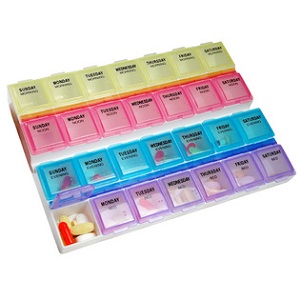


t’s important to set your daily routine when it comes to taking medication. It can be helpful to connect taking the medication with normal activities such as eating a meal (if the medication is allowed with food) or going to bed. You can also keep back-up medication in your workplace, briefcase or purse to make it easier to stay on schedule.
Daily dosing containers are available at your pharmacy. They allow you to keep medications in compartments that are labeled with the days of the week and various dosage frequencies. Keep a written or computerized schedule. List the medications you take, how often you take them, and any special directions.
There are a number of devices that have been designed to help patients adhere to a prescribed medication schedule, including pagers, wristwatches, automatic pill dispensers and even voice-command medication managers. Ask your pharmacist for suggestions on what might work best for you.
—Source: U.S. Food and Drug Administration
Good Neighbor Pharmacy Health Connection, March 2015